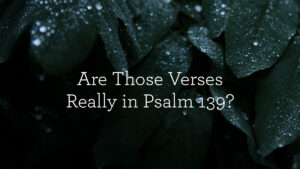Is “Worry” the Greatest Phrase to Describe Our Response to God?

The Worry of God
C. I. Scofield as soon as known as the concern of God “a phrase of Previous Testomony piety.”1 And so certainly it was. Nevertheless, the concern of God is just not a phrase of Previous Testomony piety solely, for the suitable concern of God is, fairly explicitly, a blessing of the brand new covenant. Talking of the brand new covenant, the Lord promised by means of Jeremiah:
And so they shall be my folks, and I will probably be their God. I’ll give them one coronary heart and a technique, that they might concern me ceaselessly, for their very own good and the great of their youngsters after them. I’ll make with them an eternal covenant, that I can’t flip away from doing good to them. And I’ll put the concern of me of their hearts, that they might not flip from me. (Jer. 32:38–40)
What is that this concern that the Lord will put within the hearts of his folks within the new covenant? Not like that devilish concern we now have seen that might drive us away from God, it is a concern that retains us from drawing again or turning away from him. Is it, then, the type of “spirit of slavery” (Rom. 8:15) that John Newton wrote of in his hymn “Superb Grace”?
’Twas grace that taught my coronary heart to concern,
And beauty my fears relieved.
Nicely, actually, the Spirit may cause a concern in these he’s convicting of sin, a concern that drives them to Christ for refuge. However, as Newton stated, that concern is then relieved by grace: it’s not applicable for a believer as soon as she or he has trusted in Christ. It’s a Spirit-worked concern that serves a great goal in driving sinners to Christ; it’s not, nonetheless, that concern which is “the soul of godliness”2 or “the start of knowledge” (Prov. 9:10).
This e-book argues from Scripture that godly concern is the alternative of being afraid of God or his punishment, as if he have been a tyrant. As an alternative, it’s the depth of the saints’ love for, enjoyment of, and pleasure of all that God is.
An Surprising Worry
In Jeremiah 33, the Lord goes on to elucidate the character of this new covenant concern in phrases so placing they overturn all our expectations. He guarantees:
I’ll cleanse them from all of the guilt of their sin towards me, and I’ll forgive all of the guilt of their sin and rise up towards me. And this metropolis shall be to me a reputation of pleasure, a reward and a glory earlier than all of the nations of the earth who shall hear of all the great that I do for them. They shall concern and tremble due to all the great and all of the prosperity I present for it. (Jer. 33:8–9)
This isn’t a concern of punishment—of what God may do if his folks flip away from him. Fairly the alternative: in Jeremiah 33, the Lord reels off a catalog of pure blessing.3 He’ll cleanse them, forgive them, and do nice good for them. And so they concern and tremble exactly due to all the great he does for them.
Right here is just not a concern that stands on the flip facet of the grace and goodness of God. It’s the type of concern Hosea describes when he prophesies how “the kids of Israel shall return and search the Lord their God, and David their king, they usually shall are available concern to the Lord and to his goodness within the latter days” (Hos. 3:5). It’s a concern “to the Lord and to his goodness.” It’s a concern that, as Charles Spurgeon put it, “leans towards the Lord” due to his very goodness.4 It’s the type of marveling concern we come throughout within the face of Jesus’s giving of life. When Jesus raised the widow of Nain’s son, we learn,
Then he got here up and touched the bier, and the bearers stood nonetheless. And he stated, “Younger man, I say to you, come up.” And the useless man sat up and started to talk, and Jesus gave him to his mom. Worry seized all of them, they usually glorified God, saying, “An awesome prophet has arisen amongst us!” and “God has visited his folks!” (Luke 7:14–16)
Worry and Love
Clearly, the concern of God is by no means what we, with our tradition’s allergic response to the very idea of concern, may count on. As an alternative, we will say with Spurgeon that that is the “type of concern which has in it the very essence of affection, and with out which there can be no pleasure even within the presence of God.”5 In actual fact, the nearer we glance, the nearer concern of God and love of God seem. Generally concern of God and love of God are put in parallel, as in Psalm 145:
He fulfills the will of those that concern him;
he additionally hears their cry and saves them.
The Lord preserves all who love him,
however all of the depraved he’ll destroy. (Ps. 145:19–20)
Equally, consider how Moses equates concern and love in his abstract of the regulation.
Now that is the commandment—the statutes and the principles—that the Lord your God commanded me to show you, that you could be do them within the land to which you’re going over, to own it, that you could be concern the Lord your God. . . .
Hear, O Israel: The Lord our God, the Lord is one. You shall love the Lord your God with all of your coronary heart and with all of your soul and with all of your may. (Deut. 6:1–5)
The rationale it’s not instantly apparent to us that concern and love are so comparable is that we simply misunderstand love. Love is a phrase bandied round in our lives. I “love” sitting in a comfortable armchair studying a great e-book; I “love” my household; I “love” a great chuckle with my pals. And so I can blithely assume that “love” for God is simply extra of the identical, that means nothing greater than a (maybe imprecise) predilection or desire. The place some get pleasure from pudding, I get pleasure from God.
Nevertheless, my love for one factor differs from my love for an additional as a result of love adjustments in keeping with its object. Certainly, the character of a love is outlined by its object. Let me illustrate with three true statements:
- I like and have actual affection for my canine.
- I like and have actual affection for my spouse.
- I like and have actual affection for my God.
Every is true, however studying them collectively like that ought to make you wince. You recognize there should be one thing terribly incorrect if I imply precisely the identical factor in every. You sincerely hope there’s a distinction. And there may be: the three loves differ as a result of the objects of the loves differ.
The residing God is infinitely good and quintessentially, overwhelmingly stunning in each approach: his righteousness, his graciousness, his majesty, his mercy, his all. And so we don’t love him aright if our love is just not a trembling, overwhelmed, and fearful love. In a way, then, the trembling “concern of God” is a approach of talking concerning the depth of the saints’ love for and pleasure of all that God is. The Puritan William Bates expressed it like this: “There’s nothing extra fearful than an ingenuous love, and nothing extra loving than a filial concern.”6 Equally, Spurgeon may say:
It’s not as a result of we’re afraid of him, however as a result of we enjoyment of him, that we concern earlier than him. . . . “Thine coronary heart shall concern, and be enlarged,” says the prophet Isaiah [Isa. 60:5], and so it involves go with us. The extra we concern the Lord, the extra we love him, till this turns into to us the true concern of God, to like him with all our coronary heart, and thoughts, and soul, and energy.7
The best concern of God, then, is just not the flip facet to our love for God. That type of considering was articulated by the Roman Catholic theologian Hans Urs von Balthasar when he argued that “the gospel of grace seem[s] not solely as love (which is what it’s in God) but in addition as regulation and command, as reverence, religio, distance and concern of the Lord.”8 However Moses’s command to Israel in summarizing the regulation was exactly that God’s folks ought to concern and love the Lord their God. Proper concern doesn’t stand in stress with love for God. Proper concern falls on its face earlier than the Lord, however falls leaning “towards the Lord.”9 It’s not as if love attracts close to and concern distances. Neither is this concern of God one facet of our response to God. It’s not merely that we love God for his graciousness and concern him for his majesty. That might be a lopsided concern of God. We additionally love him in his holiness and tremble on the marvelousness of his mercy. True concern of God is real love for God outlined: it’s the proper response to God’s full-orbed revelation of himself in all his grace and glory.
Notes:
- Scofield Reference Bible, 1909 ed., 607n1.
- John Murray, Ideas of Conduct: Points of Biblical Ethics (London: Tyndale, 1957), 229.
- See additionally Ps. 67:7 because the climax of the chiastic Ps. 67.
- C. H. Spurgeon, “A Worry to Be Desired,” in The Metropolitan Tabernacle Pulpit Sermons, 63 vols. (London: Passmore & Alabaster, 1855–1917), 48:495.
- Spurgeon, “A Worry to Be Desired,” 494.
- William Bates, “On the Worry of God,” in The Complete Works of the Rev. W. Bates, vol. 3 (London: James Black, 1815), 187.
- Spurgeon, “A Worry to Be Desired,” 498.
- Hans Urs von Balthasar, The Theology of Karl Barth, trans. Edward Oakes (San Francisco: Ignatius, 1992).
- Spurgeon, “A Worry to Be Desired,” 495, my emphasis.
This text is tailored from Rejoice and Tremble: The Shocking Good Information of the Worry of the Lord by Michael Reeves.
Associated Articles








